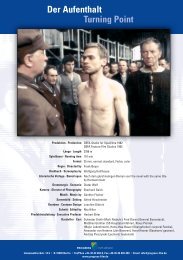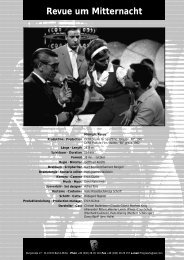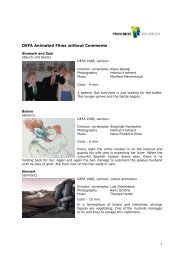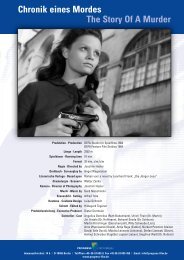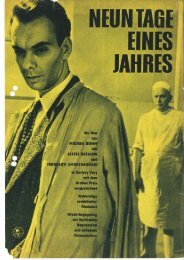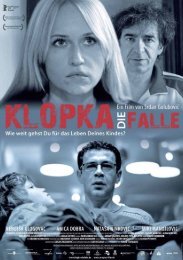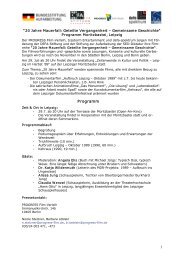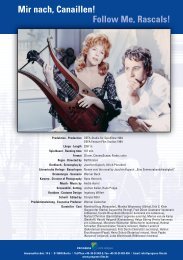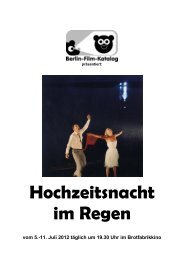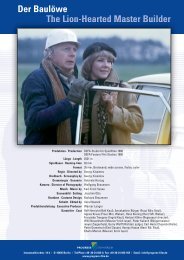Wer reißt denn gleich vor'm Teufel aus - PROGRESS Film-Verleih
Wer reißt denn gleich vor'm Teufel aus - PROGRESS Film-Verleih
Wer reißt denn gleich vor'm Teufel aus - PROGRESS Film-Verleih
Erfolgreiche ePaper selbst erstellen
Machen Sie aus Ihren PDF Publikationen ein blätterbares Flipbook mit unserer einzigartigen Google optimierten e-Paper Software.
* Layout Märchenfilme 3 20.04.2005 9:57 Uhr Seite 15<br />
<strong>Wer</strong> <strong>reißt</strong> <strong>denn</strong> <strong>gleich</strong> vor’m <strong>Teufel</strong> <strong>aus</strong><br />
Produktion · Production<br />
Who’s Afraid Of The Devil?<br />
DEFA-Studio für Spielfilme, Gruppe „Babelsberg“, 1977<br />
DEFA Feature <strong>Film</strong> Studios, ”Babelsberg“ group, 1977<br />
Länge · Length 2507 m<br />
Spieldauer · Duration 92 min.<br />
Format 35 mm - brw - fa / widescreen - color<br />
Regie · Director Egon Schlegel<br />
Drehbuch · Scriptwriters Manfred Freitag, Joachim Nestler<br />
Literarische Vorlage · Based on „Der <strong>Teufel</strong> mit den drei goldenen Haaren“, Märchen der<br />
Brüder Grimm / the fairy tale ”The Devil With The Three<br />
Golden Hairs“ by the Brothers Grimm<br />
Dramaturgie · Scenario editor Inge Wüste-Heym<br />
Kamera · Camera Wolfgang Braumann<br />
Musik · Music Günter Hauk<br />
Szenenbild · Set designer Georg Kranz<br />
Kostüme · Costumes Barbara Braumann<br />
Schnitt · Cutter Anneliese Hinze-Sokolowa<br />
Produktionsleitung · Production manager Erich Albrecht<br />
Darsteller · Cast Hans-Joachim Frank (Jakob), Dieter Franke (<strong>Teufel</strong>/devil),<br />
Rolf Ludwig (König/king), Katrin Martin (Prinzessin/princess),<br />
Wolfgang Greese (Steuereintreiber/tax-collector),<br />
Hannjo Hasse (Hofmarschall/Lord Chamberlain).<br />
Burgstraße 27 · D-10178 Berlin-Mitte · Phon +49 -30- 24 00 3-0 Fax +49 -30- 24 00 34 99 e-mail Progressfv@aol.com
* Layout Märchenfilme 3 20.04.2005 9:57 Uhr Seite 16<br />
<strong>Wer</strong> <strong>reißt</strong> <strong>denn</strong> <strong>gleich</strong> vor’m <strong>Teufel</strong> <strong>aus</strong><br />
Der arme Bursche Jakob ist vom Mißgeschick verfolgt.<br />
Und nun hat es auch noch der König auf sein Leben<br />
abgesehen, gibt er ihm doch in einem versiegelten Schreiben<br />
das eigene Todesurteil mit auf den Weg. Glücklicherweise<br />
fällt Jakob freundlichen Räubern in die Hände und<br />
die verändern kurz den Inhalt des Briefes. Am nächsten<br />
Tag sieht er sich als Bräutigam der Prinzessin. Doch die<br />
Freude ist von kurzer Dauer. Der genarrte König entsendet<br />
Jakob zum <strong>Teufel</strong>, um dessen drei goldene Haare zu<br />
holen. Damit hofft er, Jakob für immer los zu sein. Der<br />
marschiert los und verspricht unterwegs den vom König<br />
<strong>aus</strong>gebeuteten Untertanen, den <strong>Teufel</strong> nach einem Ausweg<br />
<strong>aus</strong> ihrer Not zu fragen. In der Hölle nutzt Jakob die<br />
Abwesenheit der <strong>Teufel</strong>in und tarnt sich mit deren Kleidern.<br />
Todesmutig ent<strong>reißt</strong> er dem <strong>Teufel</strong> die drei goldenen<br />
Haare und erfährt auch die Lösung für die Bauern.<br />
Als Held kehrt er zurück und einer Hochzeit steht nun<br />
nichts mehr im Wege. Und weil der <strong>Teufel</strong> so jammert,<br />
bekommt er am Ende seine drei goldenen Haare zurück.<br />
Egon Schlegel, geb. 13.12.1938 in Zwickau. Nach dem<br />
Abitur von 1961 bis 1966 Regiestudium an der Deutschen<br />
Hochschule für <strong>Film</strong>kunst, Potsdam-Babelsberg.<br />
1966 Regieassistent bei Andrew Thorndike; Dokfilmregisseur<br />
in der „Gruppe 67“. 1972 Regieassistent bei Ralf Kirsten<br />
(„Unterm Birnbaum“). 1980 bis 1990 Regisseur im<br />
DEFA-Studio für Spielfilme.<br />
Wichtige <strong>Film</strong>e: „Abenteuer mit Blasius“ (1975),<br />
„Das Pferdemädchen“ (1979), „Max und siebeneinhalb<br />
Jungen“ (1980), „Die Schüsse der Arche Noah“ (1983).<br />
„Zugegeben, der Anfang ist ein wenig umständlich und<br />
nicht leicht durchschaubar. Man weiß nicht recht, wo die<br />
Geschichte um den täppischen Jungen Jakob hingehen<br />
soll. ... Doch spätestens bei Jakobs Einzug ins Schloß des<br />
trunksüchtigen Monarchen (eine überzeugende Leistung<br />
von Rolf Ludwig!) beginnt das Vergnügen und steigert<br />
sich von Szene zu Szene. Egon Schlegel gelingt hier etwas<br />
höchst Bemerkenswertes, nämlich poetisch-satirische<br />
Überhöhung. Die beiden absoluten Glanznummern des<br />
<strong>Film</strong>s sind die Hölle und der göttliche <strong>Teufel</strong> Dieter Franke.“<br />
(Renate Holland-Moritz, in „Eulenspiegel“ Berlin 2/1978)<br />
„Die Szenen in der Hölle sind phantasievoll und witzig<br />
und können ohne weiteres mit den neuesten Erfindungen<br />
von Hollywoods Fantasy-Welle mithalten.“<br />
(R.T., in „Der Tagesspiegel“ Berlin vom 9.4.1982)<br />
INHALT · STORYLINE<br />
The poor lad Jacob is dogged by misfortune. Now even<br />
the king is out to get his hide - he hands Jacob his own<br />
death sentence in a sealed letter. Luckily, Jacob falls into<br />
the hands of friendly robbers who summarily alter the<br />
contents of the letter.The next day, he envisions himself<br />
as the princess’s bridegroom. However, this joyful<br />
moment is not to last long.The duped king sends Jacob<br />
to the devil to get the latter’s three golden hairs. In this<br />
way, the king hopes to get rid of Jacob for good. Jacob<br />
sets out; on the way, he promises the king’s exploited<br />
subjects to ask the devil how they can escape their misery.<br />
Once he has arrived in hell, he takes advantage of the<br />
she-devil’s absence by disguising himself in her clothes.<br />
Absolutely fearless, he snatches the three golden hairs<br />
from the the devil and on top of this, he finds out what<br />
the solution for the farmers is. He returns home a hero<br />
and now there’s no reason why he should not get married.<br />
And the three golden hairs are returned to the pitifully<br />
begging devil.<br />
REGISSEUR-BIOGRAPHIE · DIRECTOR’S BIOGRAPHY<br />
Egon Schlegel was born in Zwickau on 13.12.1938. After<br />
his A-level exam, he studied directing at the German <strong>Film</strong><br />
School, Potsdam-Babelsberg. 1966, assistant director to<br />
Andrew Thorndike; director of documentary films in the<br />
the ”67” group. 1972, assistant director to Ralf Kirsten<br />
(”Under the Pear Tree”). Between 1980 and 1990, director<br />
at the DEFA Feature <strong>Film</strong> Studios.<br />
Major films: ”Abenteuer mit Blasius” (1975), ”Das<br />
Pferdemädchen” (1979), ”Max und siebeneinhalb Jungen”<br />
(1980), ”Die Schüsse der Arche Noah” (1983).<br />
PRESSESTIMMEN · PRESS COMMENTS<br />
”Admittedly, the beginning is somewhat awkward and<br />
involved and not easily comprehensible. One doesn’t really<br />
know where the story of clumsy young Jacob is going.<br />
At the latest,however, when Jacob moves into the castle<br />
of the alcoholic monarch (a convincing performance by<br />
Rolf Ludwig!), the film becomes entertaining, increasingly<br />
so with every scene. Egon Schlegel has succeeded in<br />
achieving something most remarkable, namely, a poetic<br />
and satirical transposition. The two absolute highlights of<br />
the film are hell and the divine devil Dieter Franke.”<br />
(Renate Holland-Moritz in the Berlin ”Eulenspiegel”, 2/1978<br />
”The scenes set in hell are imaginative and funny.This film<br />
can easily compete with the latest inventions of Hollywood’s<br />
fantasy wave.”<br />
(R.T. in the Berlin ”Der Tagesspiegel” of 09.04.1982)



